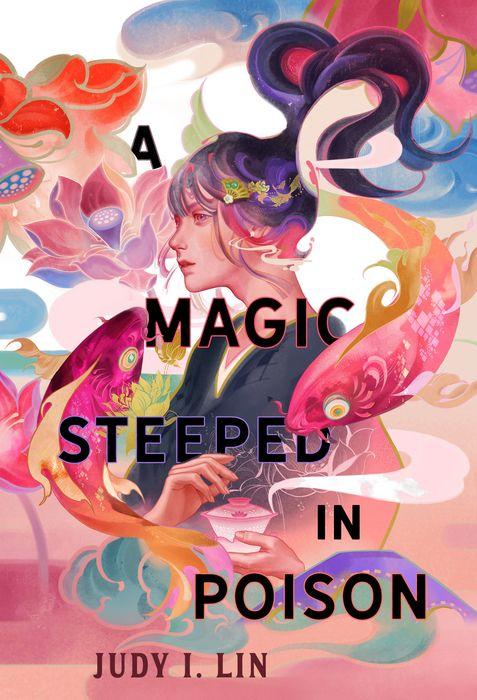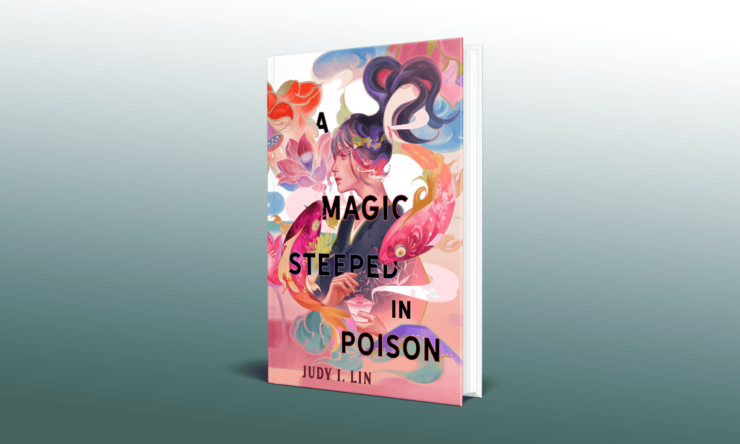I used to look at my hands with pride. Now all I can think is, “These are the hands that buried my mother.”
We’re thrilled to share an excerpt from A Magic Steeped in Poison by Judy I. Lin, out from Feiwel & Friends on March 29.
For Ning, the only thing worse than losing her mother is knowing that it’s her own fault. She was the one who unknowingly brewed the poison tea that killed her—the poison tea that now threatens to also take her sister, Shu.
When Ning hears of a competition to find the kingdom’s greatest shennong-shi—masters of the ancient and magical art of tea-making—she travels to the imperial city to compete. The winner will receive a favor from the princess, which may be Ning’s only chance to save her sister’s life.
But between the backstabbing competitors, bloody court politics, and a mysterious (and handsome) boy with a shocking secret, Ning might actually be the one in more danger.
The palace is a vision, an incredible sight to behold. I blink several times to make sure it is real. It is even grander than the great houses I glimpsed from the ferry when we approached the capital. Lacquered pillars too large for me to put my arms around hold up sweeping rooftops of purple tile. I can hardly distinguish the feelings of fear, excitement, and awe churning within me as we shuffle behind the guards. They grumble at us if we linger too long in one spot, but there is so much to marvel at.
A rock garden, arranged in perfect symmetry.
A glimmering koi pond, flickers of orange, white, and gold beneath the rippling surface.
Dainty, dark-branched cherry trees covered in shimmering pink and white flowers.
Buy the Book


A Magic Steeped in Poison
The heady scents of blossoms and incense swirl through the air of the outdoor pavilions we are guided through. We follow the guards through dizzying turns on wooden bridges and stone platforms until we reach our residences. The young women, only eleven of us, are all to be housed in the same place. The majority of the competitors are men, and many of them are older, on the cusp of being able to attend the shénnóng-shī trials at Hánxiá Academy at the age of twenty-six. I’m happy to see that Lian has also been admitted to the palace, and we both quickly choose to room together.
The stern-faced guard instructs us to remain in this wing of the palace for the duration of the competition. No wandering about the halls and getting in the way of palace servants, no cavorting with court officials to gain insight into the preferences of the judges, no sneaking out the back gate to illicitly obtain expensive ingredients.
Within the residence, each wall is lined with art of wondrous detail. Scrolls of calligraphy hang alongside elaborate paintings of serene bamboo forests or ladies posing gracefully beside orchids. Decorative walls of shelves, housing fragile vases or wood carvings. Even the incense burners are works of art—statues of monkeys in various poses.
I touch a woodprint gingerly, marveling at the detail captured in the tiny eye of a hummingbird. Lian shakes out her blankets beside me, and the embroidered flowers that trail from one edge of the silk coverlet to the other catch my eye with their vivid colors. A lump rises in my throat when I am reminded of Shu. She loves to embroider, spending hours carefully tucking each stitch in place to form petals like these. She should be in the bed next to me, talking about everything we’ve seen and everything we’ve yet to experience.
We’re not given much time to settle before we are called to the hallway in front of our pavilion. When the mid-hour gong strikes, two servant girls lead us to the first part of the competition. After passing through another maze of hallways and courtyards, we arrive at a splendid building with black stone pillars carved with an aquatic motif. Fish leap from underwater palaces and crabs scuttle around and around in patterns dazzling to the eye. The doors are the height of two men, and they open into a large chamber. The walls are covered in wood panels, which must be expensive to maintain in the humidity of the capital.
Raised platforms to the right and left are already lined with tables and occupied by seated guests. Murmurs and whispered names rise around me, speculating on the identity of the judges who have been selected to oversee the competition. At the far end of the room there is a dais, with two men seated in that place of prominence, and an empty seat in the middle waiting for one final occupant.
“Who are those officials?” I whisper to Lian as we are jostled in the crowd. We hook our arms in order not to be separated in the crowd of competitors, who are all pushing their way forward for a better view. Our feet slide on the wood floors, polished to a gleaming shine.
“The one to the left is the Minister of Rites, Song Ling,” she says. From the little I know of the court, I’m aware that this is one of the highest-ranked men in the kingdom. The four ministers oversee the Court of Officials, who advise the emperor on the governance of Dàxī.
“The one to the right is the Esteemed Qian.” This name I recognize from one of Mother’s lessons: He was the shénnóng-shī who the dowager empress recognized when she was the regent. His silver hair and long, flowing beard make him look like one of the philosophers from the classic tales. “The princess must have called him back from the academy to attend the competition. Last I heard from my mentor, he had gone to Yěliŭ to study some ancient texts.”
I’d assumed that Lian, because she is from a more distant province like me, would be less attuned to the politics of the court. But it appears my new friend also has connections in the palace. Before I can ask any other questions, the heralds call for quiet, and we kneel.
Minister Song stands to speak. “Greetings to the shénnóng-tú of our great empire. You are part of our celebrations to honor the late Dowager Empress Wuyang and her legacy. The High Lady regarded the art of tea with great respect. It is present in our culture, in our ancestry. It is a gift from the gods themselves.”
The minister drones on about the virtues of tea until my legs grow numb from kneeling. Finally, we are told to rise.
“Her Imperial Highness, the Princess Ying-Zhen!” the herald cries out.
The princess walks in through the side door, her posture erect, her movements composed. Her handmaiden follows at her side, hand on the hilt of her sword. I remember the words of the guard, about the assassination attempts that trail this young woman, and I shiver.
Even though the princess’s ceremonial robe must be heavy on her shoulders, she does not give any indication of straining under its weight. The robe is colored a shade of purple so dark it is almost black. As she moves, it sways behind her, and the threads shimmer and ripple, revealing mountain peaks and winding rivers in silver thread. She wears the kingdom on her back.
When she turns to face us, I can see how her skin glows like a pearl, even from a distance. Her mouth is a bright spot of red, like a flower petal. She settles into the chair between the minister and the shénnóng-shī and speaks:
“I look forward to what you have to present to us.” Even while sitting, the voice of the princess carries over the hall, with the confidence of one who knows she will be listened to. “The competition will commence this evening in the Courtyard of Promising Future. As the Ascending Emperor once said, farmers are the backbone of the country, and our food sustains the soul. Each of you will be assigned a dish from your province. I would like you to brew a tea that is the perfect accompaniment to your dish.
“But—” Those lips curve into a smile. “We endeavor to make each test as fair as possible. All of you will receive three silver yuan and two hours in the market to purchase your teas and additives. Those found to have spent more than the allotted amount or who do not return in time will be disqualified.”
Grumbles run through the crowd, no doubt from those with the money to purchase the more expensive teas that could have gained a foothold over others.
“The first test will be open to the public, so all can witness the beauty of the art of Shénnóng.” Her keen gaze sweeps over us, and the underlying message is clear: I trust you will not disappoint me.
The princess stands to take her leave. She is regal, poised, intimidating, older than her nineteen years.
“Glory to the princess!” one of the heralds calls out, his voice ringing down the length of the hall like a gong.
“Glory to the princess!” Those seated raise their cups in a salute. Those of us who are standing kneel and bow instead, touching our foreheads to the ground, remaining so until she leaves the room.
The competition has begun.
Excerpted from A Magic Steeped in Poison, copyright © 2022 by Judy I. Lin.










